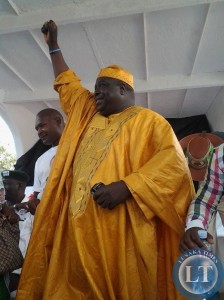
Nelson Mandela’s widow, Gracia Machel, has hit out at the South African government’s handling of the xenophobia crisis, suggesting it was playing down the scale of attacks on foreigners.
At the memorial service of Emmanuel Sithole, Gracia Machel said: “We may say that in 2008 we did not know [xenophobic attacks could occur]. Now in 2015, we can no longer say we do not know. Now we know how bad it can be. Our actions have to be proportional to the deep crisis we are going through.‘‘
Ms Machel described the recent violence as an “expression of self-hate which was inculcated by the system of apartheid”.She stressed that similar attacks would happen again unless countries throughout the region were able to provide better economic opportunities for their people.
“I stand before you as an African mother in pain. I am in pain, deep pain, because children of mine, Africans from Southern Africa, from Mozambique, are all in deep pain,” she said.
To loud applause from the crowd, Ms Machel, who is a former first lady of both South Africa and Mozambique, encouraged acceptance of all nationalities:
“I am eventually one of the most visible faces..I want to make it clear, I want to claim it clear and loud. I am a South African. I am Mozambique, I am Zambian, I am Zimbabwean. Swazi, Sotho, Tshwana, I belong to any of the nations, not all of Africa but more especially in Southern Africa…I have very deep bonds with families in each one of the countries I have mentioned…I know I feel I am at home.
“Migration is in our blood! The borders were created by colonisers. They mean nothing to us because we are one.”
Emmanuel Sithole (real name Manuel Jossias) , a Mozambican man whose violent death at the hands of a gang in a Johannesburg township was captured by a photographer and sparked outrage across Africa.The South African government has refused to add Mr Sithole’s death to the list of seven people it said had died in weeks of xenophobic violence.Jacob Zuma, the South African president, instead classified it as a “callous robbery”, adding that Mr Sithole was an illegal immigrant who used a false name to avoid detection by the authorities.
Mrs Machel rejected the claim, telling mourners at Mr Sithole’s memorial service: “Yes, these attacks are xenophobic and they have to be dealt with like that.”
Describing herself as “one of the most visible faces of a foreigner in South Africa”, she went on: “I want to say to Emmanuel: ‘I am sorry my son you had to hide your identity and adopt another for survival’.
“I want to say that you have become a symbol of what must not happen again. Your life was not wasted.” Her comments are likely to add fuel to claims that the government has “suppressed” the numbers of people killed in the anti-foreigner attacks that began in the coastal city of Durban at the beginning of this month.But other potential cases have been raised by doctors treating victims in hospitals and from accounts given by some of the thousands of foreigners driven into transit camps by the violence.
Gracia Machel said it was worrisome that in both 2008 and 2015 the most prominent victims of the xenophobic violence came from her native country, Mozambique.
Ernesto Alfabeto Nhamuave, a 35-year-old Mozambican, was burned alive during the xenophobic violence in Ekurhuleni in May 2008. Sithole was also Mozambican. The photographs of both men‘s deaths shocked the world.
Machel asked: “Why does it have to be always a Mozambican face to symbolise the pain of South Africans, Zimbabweans and Malawians?”
The causes of the attacks were “political, economic, social and even cultural”. She said: “It is up to our political leaders and business leaders to understand that if we do not create the political and economic opportunities that are going to allow any citizen of Southern Africa to feel at home anywhere, we will continue to have these kinds of situations.”
Machel said while the violence had been directed at foreigners, “tomorrow it will be against South Africans themselves”.
Johannesburg Mayor Parks Tau was among those who attended the memorial service in Alexandra‘s East Bank Hall.The City of Johannesburg and the SA Council of Churches will cover the cost of the repatriation of Sithole‘s remains.He will be buried in Mushungwe in Mozambique on Saturday.




















